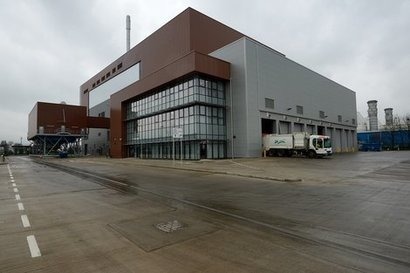
The new £72 million facility, located on Peterborough’s Fengate industrial estate, is part of the UK’s largest network of landfill diversion and energy recovery facilities and is operated by recycling and renewable energy company Viridor. Its construction, by Babcock & Wilcox Volund, is a significant step towards Peterborough City Council’s zero waste ambitions, being able to divert 95 percent of the city’s non-recyclable waste from landfill and using it as fuel to generate electricity.
Peterborough is aiming to become the UK’s Environment Capital and the ERF has also offered the city another important step towards the development of a decentralised energy network. The facility is able to process up to 85,000 tonnes of residual (black bag) waste per year, representing an electricity generation capacity of 7.25 MW – enough to power over 11,000 households and reduce the city’s carbon emissions by 10,000 tonnes per year.
An innovative funding model was developed for the project, which will receive income from the sale of electricity to the National Grid. The diversion of waste from landfill will also help the local authority to save money by avoiding the landfill tax.
The ERF will serve the city for the next 30 years. It passed its first 30-day test in late December and will now undergo further reliability testing to make sure operations are within the guaranteed plant specifications.
“Peterborough ERF is a great new asset for our partners Peterborough City Council” said Alan Cumming, Capital Projects Director for Viridor. “It is fantastic to see another world-class facility delivered safely and on schedule, this is the sixth ERF Viridor has delivered in the last 18 months. The project has delivered a significant economic boost for the area with over 250 workers employed during the construction phase, and will provide 28 full time jobs and ongoing supply chain opportunities now the facility is operational.”
Cllr John Holdich, Leader of Peterborough City Council added that the facility gives Peterborough a much-needed alternative to landfill. The waste will now be turned into electricity, thus saving the city £1 million per year for the next three decades.
For additional information:

